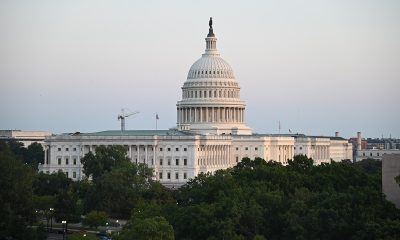National
Democrats find 2010 a tougher sell than 2008
LGBT bloggers wage ‘Don’t Ask, Don’t Give’ campaign

Democratic National Committee Executive Director Jennifer O’Malley Dillon acknowledged that for LGBT voters, the ‘pace of change isn’t always fast enough.’ (Washington Blade photo by Michael Key)
Asking gay Americans to reignite their enthusiasm for the Democratic Party at the same time critics are assailing the party for its handling of federal LGBT legislation is no small challenge.
But that’s exactly what Democratic National Committee Executive Director Jennifer O’Malley Dillon did last week while speaking at the National Stonewall Democrats biennial convention in D.C.
With three months remaining before the midterm elections, Dillon acknowledged that “an enthusiasm gap” exists between how Democratic voters feel this year compared to 2008. And she said that gap must close.
“We are going to hold the House and the Senate,” she said. “I’m very confident about that. But to do that, it’s just going to be incredibly hard. History is against us in this election.”
Also against Dillon’s efforts to rally LGBT voters are increasingly intense criticisms that President Obama and congressional leaders aren’t doing enough to enact promised changes, such as repealing “Don’t Ask, Don’t Tell” and passing the Employment Non-Discrimination Act.
Dillon recognized that the “pace of change isn’t always fast enough” for LGBT people, but said the DNC is creating new and more substantive ways to engage potential donors and volunteers.
“We want to make sure that the programs we’re building on moving forward aren’t just programs that we’re sitting in D.C. saying, ‘Oh, I think it would be great if we had ruffly stickers with rainbows on them,’ but that we are really building out a substantive program,” she said.
Dillon also said the DNC is developing communications — including material for the DNC website as part of the Your Voice Matters effort — to demonstrate in a clearer way the Obama administration’s broader accomplishments.
But discontent among many LGBT voters persists. And a continuing effort LGBT bloggers launched last year, called “Don’t Ask, Don’t Give,” urges LGBT people to withhold donations from the Democratic Party until more pro-LGBT bills are passed.
Leading the DNC boycott is John Aravosis, editor of Americablog.com, who’s asking readers to sign a pledge saying they will only contribute money to the Democratic Party after President Obama signs ENDA into law, and signs repeals of “Don’t Ask, Don’t Tell” and the Defense of Marriage Act.
Aravosis said at the start of this year that he didn’t feel inclined to whip the effort because signs had emerged that Congress would pass “Don’t Ask, Don’t Tell” repeal and ENDA. The situation changed, though, as the year progressed.
“ENDA is now nowhere to be seen and no one thinks it’s passing both houses by the election — even though we were promised,” he said. “On ‘Don’t Ask, Don’t Tell,’ the legislation being discussed isn’t full repeal. It isn’t the repeal at all, even though it’s being sold that way. It’s not even clear if the legislation is going to pass anyway at this point.”
Aravosis dismissed the notion that outreach from the Democratic National Committee could be any substitute for the advancement of these issues.
“It’s a very 1990s strategy from the DNC,” he said. “They think showing face to the gay community — simply showing up at our events is going to buy our voters and buy our money because we should be so honored that they would deign to visit us.”
Aravosis estimated about 10,000 readers of Americablog.com have pledged to withhold donations to the Democratic Party as part of the “Don’t Ask, Don’t Give” initiative.
“‘Don’t Ask, Don’t Give’ was, I think, part of a larger effort of the gay Netroots and, I would say, the community in general showing their ire at the Democrats,” Aravosis said. “I think it did change things for a while, but I think now the Democrats have backed off yet again.”
Dillon told the Blade that she hopes the DNC’s engagement with LGBT people will convince those who haven’t been satisfied to maintain their support.
“Of course, we’d like to see everyone feel like they can contribute to the party and feel good about that,” she said. “We obviously hope that people see us as a party that’s growing and building our commitment and our connection to the LGBT community, and that this is a place where people feel like their money will be well spent.”
‘We’re going to have disappointments’
Despite some disappointment, many LGBT Democrats who attended the Stonewall convention said they remain committed to the Democratic Party.
Rick Stafford, a veteran gay activist from Minnesota and chair of the Democratic Party’s LGBT caucus, said the Democratic Party is worth supporting because of the dramatic strides it’s taken in support of LGBT rights during the last decades.
“I can remember not more than 25 years ago, the Democratic Party and their leadership officials basically said to the LGBT community, ‘Go away,’” Stafford said. “We were held up as the poster child for the special interests. And in 25 years, if you told me back then that the issue that we would be fighting on disappointment was marriage equality, I would have told you [that] you were nuts.”
Stafford said LGBT critics of the Democratic Party should take care with the tone of their discussion because disagreement and discontent among Democrats led to the Republican takeover of Congress in 1994.
“We’re going to have disappointments, and not all Democratic elected officials are going to be supportive,” Stafford said. “But I think the leadership of Obama, Pelosi and even Harry Reid will be light years [ahead of] seeing Sarah Palin, Mitch McConnell or John Boehner setting the agenda for our country.”
Jerame Davis, who’s gay and co-owner of the Indiana-based LGBT website Bilerico Project, also expressed discontent about the amount of progress the party has made recently on LGBT issues.
“The one thing that has concerned me has been President Obama said he was going to be a ‘fierce advocate’ for our issues, and I’ve had trouble seeing where the advocacy was coming along, let alone the fierceness,” Davis said.
Still, Davis said the alternative to Democrats running the legislative branch of the federal government would be “far, far worse.”
“The idea of turning either of those [chambers] over to the Republicans scares me far worse than trying to continue to push our friends to be more supportive and to advocate harder for our issues,” Davis said.
Also urging continued support for Democrats was Rep. Jared Polis (D-Colo.), a gay lawmaker who spoke at the convention. He told the Blade that people who were in doubt over supporting the Democratic Party should look closely at Democratic candidates and their Republican opponents.
“The Democratic Party is the only party that stands for equality,” he said. “I think it’s important that voters weigh where both candidates are on issues like marriage equality, ENDA — and 99 times out of 100, you’ll come out in favor of the Democrat.”
Polis has been active in raising funds not only for his own his re-election, but for other Democratic candidates. He’s set up two joint fundraising committees — the Jared Polis Majority Fund and the Jared Polis Victory Fund — that have raised substantial funds for Democrats seeking election.
The Jared Polis Majority Fund has raised $26,000 over the course of this Congress, while the Jared Polis Victory Fund has raised $150,000, according to Federal Election Commission reports.
Notable donations from the Jared Polis Majority Fund in the second quarter of this year included $1,500 to David Cicilline, the gay mayor of Providence, R.I. who’s running for Congress, and $1,500 to Rep. Scott Murphy (D-N.Y.), who last year replaced Sen. Kirsten Gillibrand (D-N.Y.) upon her appointment to the U.S. Senate. The Jared Polis Victory Fund in the second quarter donated $4,000 to Sen. Michael Bennet (D-Colo.), who’s seeking to retain his U.S. Senate seat.
“We’ve been very active in helping to build a pro-equality majority in the House and I’ve focused a lot of national fundraising in helping to achieve that,” Polis said.
The notion that LGBT voters should directly support candidates they see as supportive versus supporting the Democratic Party infrastructure is a common view among many advocates.
Aravosis said the best donation tactic that LGBT people can use as the November election approaches is to support candidates “who are proven to be pro-gay and proven to have come through for us.”
“That means support Democrats who actually have fought for us, or, [get behind] those Republicans who have fought for us, although I’m not convinced there’s too many,” he said.
Davis said this approach is the best way to ensure that a majority in Congress supportive of LGBT rights is in place.
“So, the way I see it is this: find a good friend that you think is going to advocate for our issues well, and that’s where you should put your money,” Davis said.
Federal Government
UPenn erases Lia Thomas’s records as part of settlement with White House
University agreed to ban trans women from women’s sports teams

In a settlement with the Trump-Vance administration announced on Tuesday, the University of Pennsylvania will ban transgender athletes from competing and erase swimming records set by transgender former student Lia Thomas.
The U.S. Department of Education’s Office for Civil Rights found the university in violation of Title IX, the federal rights law barring sex based discrimination in educational institutions, by “permitting males to compete in women’s intercollegiate athletics and to occupy women-only intimate facilities.”
The statement issued by University of Pennsylvania President J. Larry Jameson highlighted how the law’s interpretation was changed substantially under President Donald Trump’s second term.
“The Department of Education OCR investigated the participation of one transgender athlete on the women’s swimming team three years ago, during the 2021-2022 swim season,” he wrote. “At that time, Penn was in compliance with NCAA eligibility rules and Title IX as then interpreted.”
Jameson continued, “Penn has always followed — and continues to follow — Title IX and the applicable policy of the NCAA regarding transgender athletes. NCAA eligibility rules changed in February 2025 with Executive Orders 14168 and 14201 and Penn will continue to adhere to these new rules.”
Writing that “we acknowledge that some student-athletes were disadvantaged by these rules” in place while Thomas was allowed to compete, the university president added, “We recognize this and will apologize to those who experienced a competitive disadvantage or experienced anxiety because of the policies in effect at the time.”
“Today’s resolution agreement with UPenn is yet another example of the Trump effect in action,” Education Secretary Linda McMahon said in a statement. “Thanks to the leadership of President Trump, UPenn has agreed both to apologize for its past Title IX violations and to ensure that women’s sports are protected at the university for future generations of female athletes.”
Under former President Joe Biden, the department’s Office of Civil Rights sought to protect against anti-LGBTQ discrimination in education, bringing investigations and enforcement actions in cases where school officials might, for example, require trans students to use restrooms and facilities consistent with their birth sex or fail to respond to peer harassment over their gender identity.
Much of the legal reasoning behind the Biden-Harris administration’s positions extended from the 2020 U.S. Supreme Court case Bostock v. Clayton County, which found that sex-based discrimination includes that which is based on sexual orientation or gender identity under Title VII rules covering employment practices.
The Trump-Vance administration last week put the state of California on notice that its trans athlete policies were, or once were, in violation of Title IX, which comes amid the ongoing battle with Maine over the same issue.
New York
Two teens shot steps from Stonewall Inn after NYC Pride parade
One of the victims remains in critical condition

On Sunday night, following the annual NYC Pride March, two girls were shot in Sheridan Square, feet away from the historic Stonewall Inn.
According to an NYPD report, the two girls, aged 16 and 17, were shot around 10:15 p.m. as Pride festivities began to wind down. The 16-year-old was struck in the head and, according to police sources, is said to be in critical condition, while the 17-year-old was said to be in stable condition.
The Washington Blade confirmed with the NYPD the details from the police reports and learned no arrests had been made as of noon Monday.
The shooting took place in the Greenwich Village neighborhood of Manhattan, mere feet away from the most famous gay bar in the city — if not the world — the Stonewall Inn. Earlier that day, hundreds of thousands of people marched down Christopher Street to celebrate 55 years of LGBTQ people standing up for their rights.
In June 1969, after police raided the Stonewall Inn, members of the LGBTQ community pushed back, sparking what became known as the Stonewall riots. Over the course of two days, LGBTQ New Yorkers protested the discriminatory policing of queer spaces across the city and mobilized to speak out — and throw bottles if need be — at officers attempting to suppress their existence.
The following year, LGBTQ people returned to the Stonewall Inn and marched through the same streets where queer New Yorkers had been arrested, marking the first “Gay Pride March” in history and declaring that LGBTQ people were not going anywhere.
New York State Assemblywoman Deborah Glick, whose district includes Greenwich Village, took to social media to comment on the shooting.
“After decades of peaceful Pride celebrations — this year gun fire and two people shot near the Stonewall Inn is a reminder that gun violence is everywhere,” the lesbian lawmaker said on X. “Guns are a problem despite the NRA BS.”
New York
Zohran Mamdani participates in NYC Pride parade
Mayoral candidate has detailed LGBTQ rights platform

Zohran Mamdani, the candidate for mayor of New York City who pulled a surprise victory in the primary contest last week, walked in the city’s Pride parade on Sunday.
The Democratic Socialist and New York State Assembly member published photos on social media with New York Attorney General Letitia James, telling followers it was “a joy to march in NYC Pride with the people’s champ” and to “see so many friends on this gorgeous day.”
“Happy Pride NYC,” he wrote, adding a rainbow emoji.
Mamdani’s platform includes a detailed plan for LGBTQ people who “across the United States are facing an increasingly hostile political environment.”
His campaign website explains: “New York City must be a refuge for LGBTQIA+ people, but private institutions in our own city have already started capitulating to Trump’s assault on trans rights.
“Meanwhile, the cost of living crisis confronting working class people across the city hits the LGBTQIA+ community particularly hard, with higher rates of unemployment and homelessness than the rest of the city.”
“The Mamdani administration will protect LGBTQIA+ New Yorkers by expanding and protecting gender-affirming care citywide, making NYC an LGBTQIA+ sanctuary city, and creating the Office of LGBTQIA+ Affairs.”




















